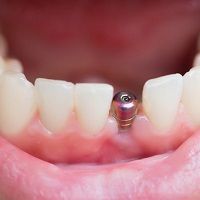New Nanocoatings Could Help Prevent Peri-Implantitis
A team of researchers in the United Kingdom is investigating the effectiveness of a new implant nanocoating to reduce the risk of peri-implantitis. The team coated titanium alloy implants with silver, titanium oxide, and hydroxyapatite, then studied the implants' ability to resist biofilms. The researchers hope these nanocoatings will have longer-lasting effects than what is currently on the market.

Peri-implantitis, an inflammatory condition that affects the soft tissues and bones surrounding dental implants, is a causative factor in the failure of many dental implants. Over 18 million Americans have some form of dental implant — crowns, bridges, or others – but up to 10 percent of them fail, leading to more necessary dental work and expense for many patients. In an attempt to produce new technology to help prevent implants from failing, researchers from three departments of the University of Plymouth in the United Kingdom have developed a new nanocoating they believe will reduce the risk of a patient developing peri-implantitis.
The research team used a combination of silver, titanium oxide, and hydroxyapatite nanocoatings that they then applied to the surface of titanium alloy dental implants. In clinical tests, the nanocoating combination was shown to successfully inhibit bacterial growth. The coating also reduced the formation of bacterial biofilm on the surface of the implants by as much as 97.5 percent.
In addition, the anti-biofilm properties of the nanocoating combination were shown to support the successful integration of the implant into the surrounding bone. Bone healing was also accelerated during clinical testing.
Alexandros Besinis, lecturer in mechanical engineering at the University of Plymouth and member of the research team, said, “Current strategies to render the surface of dental implants antibacterial with the aim to prevent infection and peri-implantitis development, include application of antimicrobial coatings loaded with antibiotics or chlorhexidine. However, such approaches are usually effective only in the short-term, and the use of chlorhexidine has also been reported to be toxic to human cells. The significance of our new study is that we have successfully applied a dual-layered silver-hydroxyapatite nanocoating to titanium alloy medical implants which helps to overcome these risks."
The new nanocoating comes at a time that is seeing increases in the number of patients expected to need some type of dental implant. It is anticipated that up to 500,000 new patients will need a dental implant each year, which is reflected in the global dental implant market. That market is expected to grow to $4.2 billion by 2022.
Christopher Tredwin, Head of the university’s Peninsula School of Dentistry, says, “The potential of our work for increased patient comfort and satisfaction, and reduced costs, is great and we look forward to translating our findings into clinical practice."